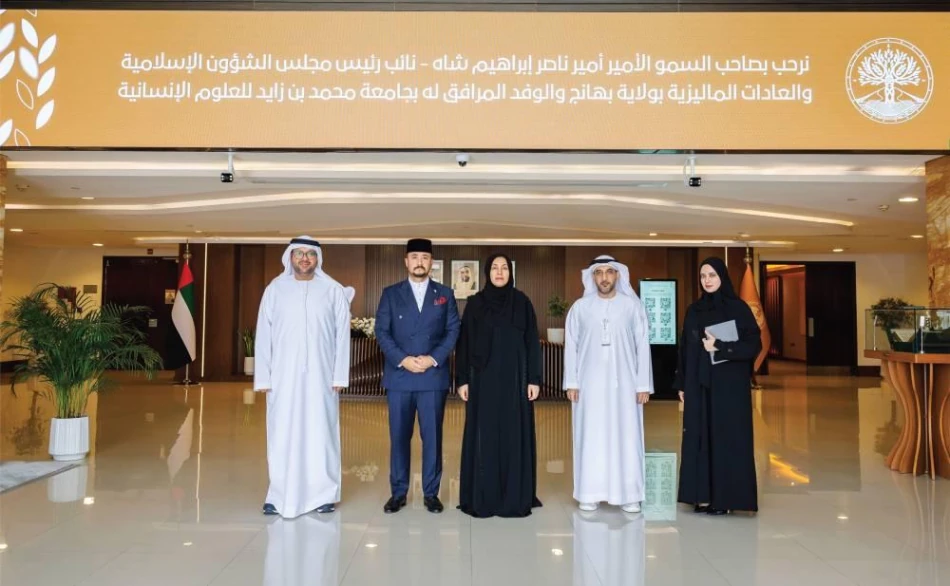
UAE's Mohamed bin Zayed University Explores Collaboration with Malaysia's Islamic University
UAE-Malaysia Academic Partnership Signals Growing Islamic Education Diplomacy
Mohammed bin Zayed University for Humanities has strengthened its international academic ties with Malaysia's Pahang Islamic Affairs Council, as Prince Amir Nasir Ibrahim Shah visited the Abu Dhabi campus to explore collaborative opportunities in Islamic studies and cultural exchange. The meeting reflects the UAE's expanding soft power strategy through educational partnerships across the Muslim world.
Strategic Academic Collaboration Takes Shape
During his visit to the university's Abu Dhabi headquarters, Prince Amir Nasir Ibrahim Shah, Deputy Chairman of the Pahang Islamic Affairs and Customs Council, met with Dr. Nidal Al Tunaiji, Advisor to the University Director. The discussions centered on the university's academic and cultural programs in Islamic studies and humanities, highlighting how educational institutions are becoming key diplomatic bridges between Muslim-majority nations.
The talks emphasized the role of languages as cultural connectors, with both parties exploring how diverse academic and cultural programs can facilitate cross-cultural understanding and promote constructive dialogue between communities.
UAE's Model of Tolerance Draws International Interest
Prince Amir Nasir Ibrahim Shah's visit forms part of his broader study of the UAE's approach to fostering social cohesion and peaceful coexistence. The Emirates has positioned itself as a regional leader in promoting moderate Islamic values, investing heavily in educational institutions that emphasize tolerance, mercy, and justice as core Islamic principles.
This positioning has proven attractive to other Muslim nations seeking to modernize their educational approaches while maintaining religious authenticity. The UAE's success in balancing traditional Islamic scholarship with contemporary academic standards offers a replicable model for countries like Malaysia.
Educational Diplomacy in the Islamic World
The partnership reflects a broader trend of Islamic nations leveraging educational cooperation to strengthen bilateral relations. Similar to how Qatar has used its universities to build international partnerships, the UAE is positioning its academic institutions as hubs for Islamic scholarship that appeal to both traditional and progressive Muslim communities.
Malaysia's interest in the UAE model is particularly significant given Pahang state's influence in Malaysian Islamic affairs. Such partnerships could facilitate student exchanges, joint research programs, and collaborative curriculum development that benefits both nations' educational sectors.
Implications for Regional Islamic Education
This collaboration signals the UAE's growing ambition to become a center for moderate Islamic education in the region. By attracting interest from established Islamic institutions in Southeast Asia, the UAE demonstrates how educational soft power can complement its economic and diplomatic initiatives.
For Malaysia, partnering with UAE institutions provides access to innovative approaches in Islamic education that have successfully operated in a multicultural, economically dynamic environment. This could prove valuable as Malaysia continues developing its own Islamic education sector within a diverse society.
Most Viewed News

 Omar Rahman
Omar Rahman






